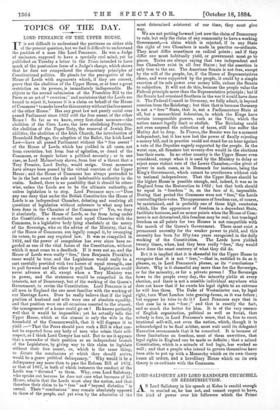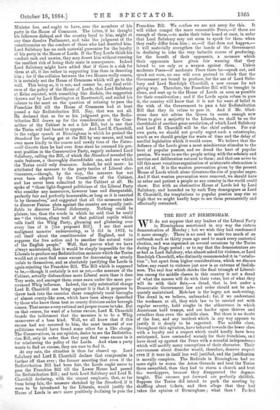LORD SALISBURY AND LORD RANDOLPH CHURCHILL ON REDISTRIBUTION.
AS Lord Salisbury in his speech at Kelso is candid enough to remind us, he has not, and cannot expect to have, the kind of power over his followers which the Prime Minister has, and ought to have, over the members of his party in the House of Commons. The latter, if he thought his followers disloyal and the country loyal to him, might at any time dissolve Parliament, and take the judgment of the constituencies on the conduct of those who had deserted him. Lord Salisbury has no such material guarantee for the loyalty of his party in the House of Lords. If the Tory Lords think his conduct rash and unwise, they may desert him without running the smallest risk of losing their seats in consequence. Indeed Lord Salisbury might have added that if there is a risk for them at all, it lies rather in supporting him than in deserting him ; for if the collision between the two Houses really comes, it is certainly not the House of Commons which will go to the wall. This being so, it is not, and cannot be, any final evid- ence of the policy of the House of Lords, that Lord Salisbury at Kelso rejected, with something like disdain, the suggestion thrown out by Lord Hartington at Rawtenstall, and nailed his colours to the mast on the question of refusing to pass the Franchise Bill till the House of Commons had at least passed a fair Redistribution Bill. Nay, that was not all. He declared that so far as his judgment goes, the Redis- tribution Bill drawn up for the consideration of the Com- mittee of the Cabinet is not a fair Bill, but is one that the Tories will feel bound to oppose. And Lord R. Churchill, in the vulgar speech at Birmingham in which he praised the Standard for having got at the Bill by any means, and took even more kindly to the coarse and rowdy tone of the Eatan- swill Gazette than he had ever done since he assumed his pre- sent position in the Conservative Party, eagerly endorsed Lord Salisbury, calling the Bill, of which the Standard revealed the main features, a thoroughly discreditable one, and one which the Tories could only denounce. Indeed, he said more : he attributed the measure to the party tactics of Liberal elec- tioneerers,—though, by the way, the measure has not even been adopted by the Committee of the Cabinet, and has never been submitted to the Cabinet at all. He spoke of "those light-fingered politicians of the Liberal Party who consider any manceuvre, however base and disreputable, perfectly fair and perfectly honourable, as long as it is resorted to by themselves," and suggested that all the measures taken to discover Fenian plots against the country are equally justi- fiable to discover Liberal dishonesty. Nothing could be plainer, too, than the words in which he said that he could see "the vicious, slimy trail of that political reptile which calls itself the Whig Party, gleaming and glistening over every line of it [the proposed Bill]. I see that most malignant monster endeavouring, as it did in 1832, to coil itself about the constituencies of England, and to suppress the free action and to smother the natural voice of the English people." Well, that proves what we have always maintained, that it would be simply impossible for the Liberals to produce any Redistribution measure which the Tories would not at once find some excuse for denouncing as utterly unfair to themselves, and as absolutely justifying the Lords in again rejecting the Franchise Bill. The Bill which is supposed to be,—though it certainly is not as yet,—the measure of the Cabinet, actually disfranchises more Liberal seats than it does Tory seats, and amongst them some seats under the most pro- nounced Whig influence. Indeed, the only substantial charge Lord R. Churchill can bring against it is that it proposes to throw back into the counties those completely rural boroughs of almost county-like area, which have been always described by those who know them best as county divisions under borough names. That seems a very rational and proper course to take. But on that course, for want of a better excuse, Lord R. Churchill founds the indictment that the measure is to be a Whig manceuvre of a base kind. Well, we all know that if this excuse had not occurred to him, the most immoral of our politicians would have found some other for a like charge. The Conservatives, in our opinion, desire to see the Redistribu- tion Bill, only in order that they may find some excuse in it • for reinforcing the policy of the Lords. And when a party wants to find an excuse, they are sure to find it. At any rate, the situation is thus far cleared up. Lord Salisbury and Lord H. Churchill declare that compromise is further off than ever ; the former asserting that even if the Redistribution Bill had been fair, the Lords ought never to pass the Franchise Bill till the Lower House had passed the Redistribution Bill; and both Lord Salisbury and Lord R. Churchill declaring, with the utmost emphasis, that, so far from being fair, the measure sketched by the Standard, if it were to be introduced by the Liberals, would justify the House of Lords in once more positively declining to pass the Franchise Bill. We confess we are not sorry for this. It will either compel the more reasonable Peers,—if there are enough of them,—to make their voice heard at once, in order that Lord Salisbury may not seem to speak for them when they really differ from him ; or,—if that does not happen,— it will materially strengthen the hands of the Government in declining to take the very- imbecile course of producing, for the benefit of their opponents, a measure which their opponents have given fair warning that they intend to use only as a weapon against them. Unless moderate Peers—if moderate Peers there be—speak out, and speak out soon, no one will even pretend to think that the Government are bound to produce, for the use of Lord Salis- bury and Lord Randolph Churchill, a new excuse for not giving way. Therefore, the Franchise Bill will be brought in alone, and sent up to the House of Lords as soon as possible for their consideration ; and if the Lords again refuse to pass it, the country will know that it is not for want of belief in the wish of the Government to pass a fair Redistribution Bill that they do refuse to pass it. And if Mr. Glad- stone does not advise the Queen to create enough new Peers to give a majority to the Liberals, we shall be on the threshhold of another great revolution, of which Lord Salisbury and Lord R. Churchill will be the chief authors. For our own parts, we should not greatly regret such a catastrophe, much as we should grudge the waste of time and the delay of needful legislation which it would cause. We believe that the defiance of the Lords gives a most mischievous stimulus to the heat of popular passion, and we dread the heat of popular passion. We want to see the people acting with the sobriety and caution and deliberation natural to them; and that can never be till this most vexatious organisation of aristocratic obstruction is got rid of. It is the wanton provocation given by the present House of Lords which alone threatens the rise of popular anger. And if that wanton provocation were removed, we should have as sober and patient a people as any country in the would could show. But with an obstructive House of Lords led by Lord Salisbury, and hounded on by such Tory demagogues as Lord R. Churchill, the temptations to popular passion may rise so high that we might hardly hope to see them permanently and effectually restrained.



































 Previous page
Previous page